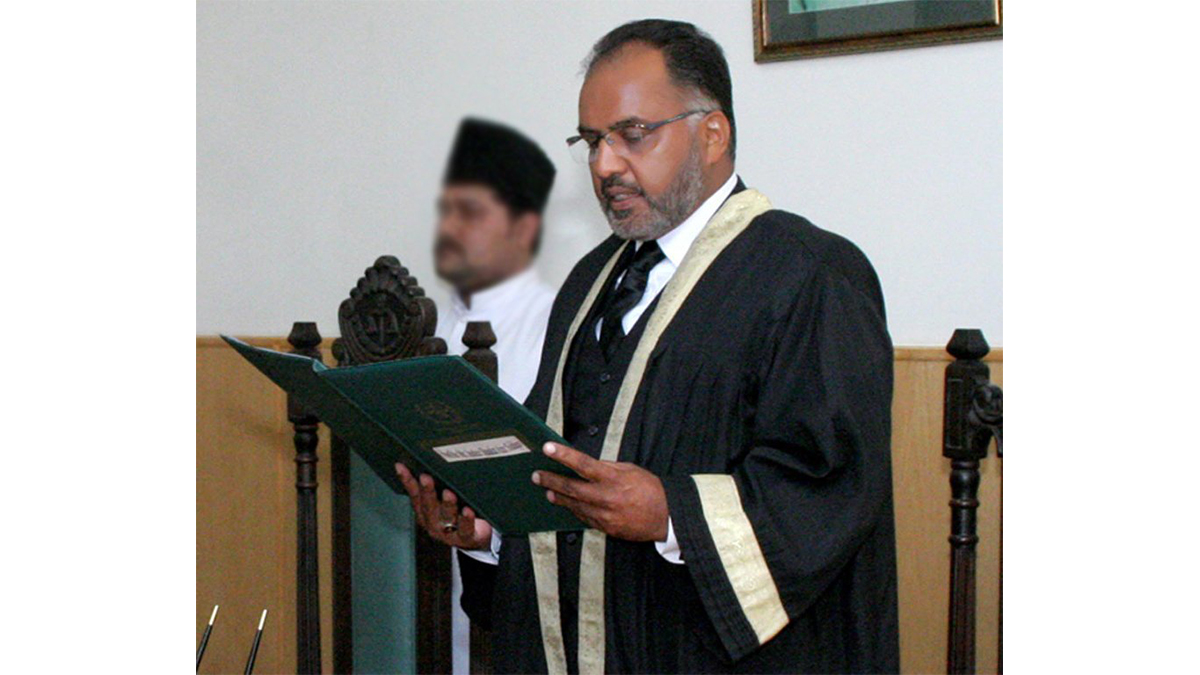- Legal Education and Access Portal
Re: Supreme Judicial Council No. 347 of 2018 (Inquiry against Mr. Justice Shaukat Aziz Siddiqui)
Date of hearing: 1.10.2018.
Court: Supreme Judicial Council
Name: Re: Supreme Judicial Council No. 347 of 2018 (Inquiry under article 209 of the Constitution of the Islamic Republic of Pakistan, 1973 against Mr. Justice Shaukat Aziz Siddiqui, Judge, Islamabad High Court, Islamabad)
Judges Present: Chairman, Chief Justice of Pakistan, Mian Saqib Nisar,
Judge Supreme Court Pakistan, Mr. Justice Asif Saeed Khan Khosa,
Judge Supreme Court Pakistan, Mr. Justice Gulzar Ahmed,
Chief Justice, High Court Sindh, Mr. Justice Ali M. Shaikh,
Chief Justice, Lahore High Court, Mr. Justice Muhammad Yawar Ali.
The Judge in question Mr. Justice Shaukat Aziz, Judge of the Islamabad High Court, gave a speech at a meeting of the district bar association, Rawalpindi, on 21st July 2018. In his speech, while pointing out that Pakistan had poor economic progress and a worse track record of upholding the constitution, he stated that the judiciary was responsible for half of the fear and coercion pervading the country. He blamed the Inter Service Intelligence (ISI), the military intelligence agency of Pakistan, of manipulating judicial proceedings by force and bribery. He stated that he was offered to be absolved of all references pending against him and to be promoted to the position of the chief justice of the High Court, if he decided cases according to agency’s preferences, however, all such offers were turned down by him. A specific allegation was made against the Chief Justice of the Islamabad High Court who was alleged to have been approached by the ISI to ensure that Nawaz Sharif and Maryam Nawaz remained imprisoned during the General Election 2018 and to exclude Justice Shaukat Aziz from the bench presiding over their case, which was alleged to have been accepted by the judge. This, Justice Aziz blamed to have compromised the independence of the judiciary in Pakistan. The same was said for the media outlets in the country who were blamed for publishing stories and tweets according to the directions of the ISI.
The Secretary of the Supreme Judicial Council (SJC), the registrar of the Supreme Court Pakistan, submitted a note to the SJC to consider the allegations levied by Justice Shaukat Aziz, in particular the manipulation of the judiciary by the ISI. This was accepted by the Chairman of the SJC as a matter requiring attention and he directed the Chief Justice of the Islamabad High Court to respond to the allegations made against him by Justice Shaukat Aziz, of pronouncing decisions while being controlled by the ISI. This the Chief Justice, Muhammad Anwar Khan Kasi, categorically denied.
On the 22nd of July 2018, Justice Shaukat Aziz requested the Council to probe the veracity of the facts presented by him in his speech. The Chairman of the Council, Mian Saqib Nisar, submitted the matter for deliberation to Mr Justice Asif Saeed Khan Khosa who decided that the speech was violative of articles II, III, IV and IX of the Code of Conduct, which led to the constitution of a commission on 30th July 2018 to examine the matter.
The council issued a show cause notice to the respondent, Justice Shaukat Aziz, calling him to explain the conduct in question as his actions were rendered to be unbecoming of the office of a judge (as mandated by the third schedule to the constitution) and violative of the Code of Conduct for Judges of the High Court and Supreme Court (as per para 3(1) and 5 of the Supreme Judicial Council Procedure of Enquiry 2005) following the grounds for removal of a judge as provided by article 209(5)(b) and (6) of the Constitution of Pakistan.
In his preliminary reply to the Council, Justice Shaukat Aziz stated that he had been persecuted for not falling in line with the demands made of him. He termed all the references against him to be silencing free speech and that he knew that as a result of him speaking out, he would be silenced and victimised. His right to deliver a speech was protected by article 19 of the constitution and the disclosures made by him could not be termed to be ‘misconduct’ as it was his duty and his right to speak out and to inform his parent bar association, when he noticed the manipulation of the judiciary through the intelligence agency’s interference in the working of the Islamabad High Court. This, he stated to be the right of a democratic society. In his Added Reply later, he included separate interactions between him, the Chief Justice of the Islamabad High court and named officers of the Pakistan Army at his personal residence. He denied that he had violated the Code of Conduct and that he had maligned the superior judiciary, rather, he was trying to defend the superior judiciary and the constitution from unlawful intervention. He predicted the outcome of the ‘premeditated inquiry’ against him which would not be in his favour. He also asserted that instead of calling him to verify his statements through objective evidence, his word should be taken as proof as he was a sworn justice of the Islamabad High Court.
In response to his submissions, the council, lead by Chief Justice of Pakistan, Mian Saqib Nisar, decided to proceed with the matter and directed the Attorney General of Pakistan to conduct this reference against Justice Shaukat Aziz, who was required to be present in person for the next hearing.
On the 1st of October, the Council met again to hear the Attorney General (AG) of Pakistan. The AG termed allegations of interference and coercion in the work of the judiciary to be factually incorrect. He submitted that the entire judiciary as an institution, had been targeted by the Judge’s speech as he had tried and succeeded in inciting hatred against the superior judiciary. Regarding the concerns of misconduct, the AG submitted that the word had not been defined in article 209 of the Constitution as its meaning had been left to the discretion of the SJC. The 2005 Procedure deemed misconduct to be disregard of the Code of Conduct and also to be conduct ‘unbecoming of a judge’. For this, particular reference was made to Justice Siddiqui’s reply where he and his counsel both submitted that he could have made a better choice of words in his speech.
The SJC decided to turn this into an inquiry as allowed by article 209(5) of the Constitution (Justice Shaukat Aziz Siddiqui and Others v. Federation of Pakistan through Secretary Law and Justice, Islamabad and Others (PLD 2018 SC 538)). Given the proceedings which had already taken place, the Council then had complete discretion as to the procedure which was to be followed to suit the requirements of the inquiry (Procedure para 8(7)). The SJC framed the issue requiring its attention to not be the truth of the statements made by the Judge, but instead, if a senior serving member of the High Court ought to have made such allegations at a public forum or not, particularly in the presence of media broadcasting it on national television. Therefore the only question the Council decided to look at was the propriety of the conduct of the judge in making such as speech and the issue of his intentions in doing so were not within the scope of the inquiry.
The council termed Judge Siddiqui’s allegations ‘wild and pervasive’ as these did not appreciate the thousands of judges performing their duties with honesty and independent of external influence, as he himself claimed to be one such judge. He was described to have ‘thrown caution to the wind’ in making these statements as it ‘lowered the estimation of the judiciary as a whole’.
In response to the remarks made for the former Chief Justice of Pakistan, Mr. Justice Muhammad Munir, the Council stated these to be made in a language ‘unfit for a gentleman’ and not befitting a Judge of the High Court. The statements made were termed to be a personal opinion of Justice Aziz which he was not expected to voice on a public forum in a derogatory manner. Since he provided no evidence for these opinions, it was unacceptable for an incumbent judge to voice such opinions in a public forum. Comments on political matters were forbidden for a judge and these coupled with his comments regarding senior judges were conduct unbecoming of a judge.
Regarding the attempts to influence him by the ISI, the Judge was seen to not have divulged any details of such occurrences. The details that he did provide such as the names of the army officials who visited him on specific dates at his personal residence in Islamabad were not confirmed independently. The Council further questioned why such officers were entertained in the first place and why judicial matters were discussed with them, without any proceedings of contempt ever being initiated against anyone. The judge’s motives for going to a public forum rather than the Chief Justice of Pakistan were also questioned and his acts were termed to be a ‘publicity of his virtues’.
The submission of Justice Shaukat Aziz, that the ISI was carefully manipulating judicial decisions, was termed to be a ‘bald allegation sans any proof whatsoever’ which was held to signify the judge’s lack of wisdom and restraint.
The statements regarding the case of Nawaz Sharif and his daughter made it seem like any bench not including Justice Aziz would be a bench the ISI would be at ease with which promoted the idea of lack of honesty and independence for the rest of the judges of the Islamabad High Court, which itself was a misconduct warned of by the Code of Conduct in explicit terms. The same was stated for the allegations of compromised independence towards the Supreme Court of Pakistan. References to the cases of the Sharifs’ were thought of by the Council as an eyebrow raising interest in a case which had yet to reach the High Court, raising concerns about the Judge’s own impartiality.
Comments made against the proceedings of the SJC were also held to be inappropriate as they comprised of the most senior members of the Judiciary of Pakistan, including the Chief Justice of the Country.
Regarding the alleged bribe offered to the Judge by the ISI, to be appointed as the Chief Justice of the Islamabad High Court, the council described the elaborate recommendation and confirmation process which allowed for such a result to materialise. The Council stated that the judge’s belief that an intelligence agency was powerful enough to achieve this result was a product of his own naivety. It seemed to the council that the judge was all too willing to believe in the power of and succumbing to the pressure by alleged interference of the ISI which was termed to be a weakness in his character.
All the judge’s allegations were held to be general, uncorroborated and based on his own personal views and beliefs or hearsay which he should have avoided voicing at a public forum in his capacity as a judge.
The defence of freedom of speech invoked by the Judge was seen to be misplaced as article 194 required judges to abide by a code of conduct issued by the SJC which included the requirement to ‘abide by certain traditional requirements of behaviour in the judges of the Superior Courts’. Openly criticising other superior judges and courts and other constitutional institutions was abstained from traditionally by judges. The Code of Conduct was installed to ensure that a judge’s freedoms were kept under ‘certain disciplines’ and therefore art 19 did not permit a judge to divulge his personal opinions on senior members of the judiciary.
In making all these unsubstantiated allegations, the Council ruled Justice Shaukat Aziz to have violated many articles of the Code of Conduct issued under the mandate of article 209(8) of the Constitution of Pakistan. The Council noted that a judge should always be proper in the use of his tongue and should not seek extra publicity and not involve himself in controversy, at least on a political question. This was also required by the Code of Conduct which mandates judicial behaviour to include maintenance of harmony among all courts for the institution of justice for which disagreements must always be expressed in terms of courtesy and restraint. The Council also agreed with the AG’s submissions where he described the Code of Conduct to not be exhaustive as requirements of judicial behaviour are not possible to be compiled in one exhaustive list. The case of Malik Shaukat Ali Dogar was referred to where the Supreme Court of Pakistan forbade the general, non-specific condemnation of the state institutions to promote a feeling of despondency or helplessness from a group of individuals (judges) which is looked towards for its balance, restraint and the ability to guide and control.
Pursuant to this decision, the court ordered Justice Shaukat Aziz to be removed from office pursuant to article 209(6) of the Constitution of Pakistan.



